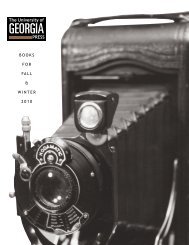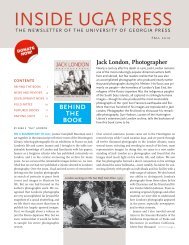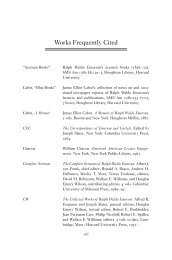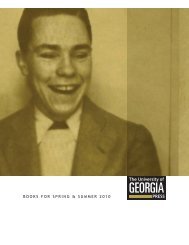Spring 2008 - University of Georgia Press
Spring 2008 - University of Georgia Press
Spring 2008 - University of Georgia Press
Create successful ePaper yourself
Turn your PDF publications into a flip-book with our unique Google optimized e-Paper software.
“Closer to the Truth<br />
Than Any Fact”<br />
Memoir, Memory, and Jim Crow<br />
July<br />
6 x 9 | 176 pp.<br />
Cloth, $34.95s | 978-0-8203-3069-3<br />
Jennifer Jensen Wallach<br />
How should historians use autobiography?<br />
Although historians frequently use memoirs as source material, too<br />
<strong>of</strong>ten they confine such usage to the anecdotal, and there is little<br />
methodological literature regarding the genre’s possibilities and<br />
limitations. This study articulates an approach to using memoirs as<br />
instruments <strong>of</strong> historical understanding. Jennifer Jensen Wallach<br />
applies these principles to a body <strong>of</strong> memoirs about life in the<br />
American South during Jim Crow segregation, including works by<br />
Zora Neale Hurston, Willie Morris, Lillian Smith, Henry Louis<br />
Gates Jr., William Alexander Percy, and Richard Wright.<br />
Wallach argues that the field <strong>of</strong> autobiography studies, which is<br />
currently dominated by literary critics, needs a new theoretical<br />
framework that allows historians, too, to benefit from the interpretation<br />
<strong>of</strong> life writing. Her most provocative claim is that, due to the aesthetic<br />
power <strong>of</strong> literary language, skilled creative writers are uniquely<br />
positioned to capture the complexities <strong>of</strong> another time and another<br />
place. Through techniques such as metaphor and irony, memoirists<br />
collectively give their readers an empathetic understanding <strong>of</strong><br />
life during the era <strong>of</strong> segregation. Although these reminiscences<br />
bear certain similarities, it becomes clear that the South as it was<br />
remembered by each is hardly the same place.<br />
“Historians and particularly history students will find many valuable<br />
insights in this book. Wallach lays out a theoretical framework for<br />
understanding memoirs as source material and then does an excellent<br />
job <strong>of</strong> putting that theory into practice.”<br />
—Steve Estes, author <strong>of</strong> I Am a Man<br />
“Wallach’s interdisciplinary training allows her to demonstrate how<br />
attention to language, symbolism, allegory, and other literary devices<br />
can uncover more historically relevant content in a memoir than a mere<br />
surface reading would allow. This is a well-written and well-argued<br />
response to a single question: How should historians handle literary<br />
memoirs as historical sources?”<br />
—Jennifer Ritterhouse, author <strong>of</strong> Growing Up Jim Crow<br />
Also <strong>of</strong> interest<br />
Race, Reason, and Massive Resistance<br />
The Diary <strong>of</strong> David J. Mays, 1954-1959<br />
Edited by James R. Sweeney<br />
Cloth, $39.95s | 978-0-8203-3025-9<br />
Politics and Culture in the<br />
Twentieth-Century South<br />
Sacred Mission, Worldly Ambition<br />
Black Christian Nationalism<br />
in the Age <strong>of</strong> Jim Crow<br />
Adele Oltman<br />
Cloth, $34.95s | 978-0-8203-3036-5<br />
Jennifer Jensen Wallach is an assistant pr<strong>of</strong>essor <strong>of</strong> history at <strong>Georgia</strong> College and<br />
State <strong>University</strong>. She has also taught at Stonehill College.<br />
Charles Bittner<br />
History<br />
www.ugapress.org 800.266.5842 23






